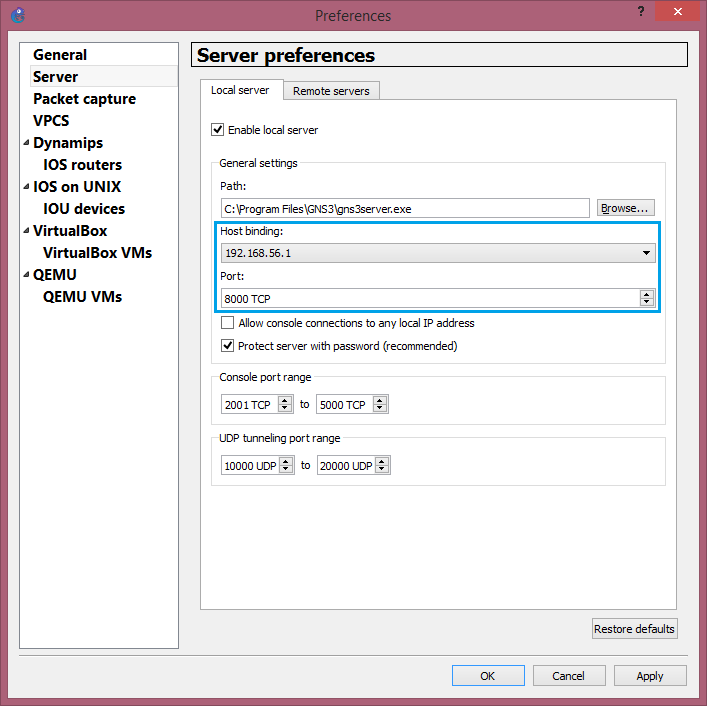I recently got a new laptop at work. It has one major downside, it only has 4GB of RAM which is soldered straight into the motherboard and therefore can not be upgraded. Also 500MB of the RAM is reserved for the GPU, so I only have about 3.5GB of useabe RAM. This is fine for running my day to day applications for work, but does not leave much wiggle room for running GNS3. Luckily I work for a hosting company and we have quite a few servers lying around doing nothing. I managed to get hold of a decommisioned server with 2 quad core processors and 48GB of RAM, perfect to run a remote GNS3 server on. We mainly use Centos and since it is not an OS I am familiar with (I mainly use Ubuntu) I decided to give it a go and try something new.
In this post I will run through the steps I went through to get GNS3 sevrer running on Centos as well as setting up the GNS3 GUI to connect to the remote server. Install the dependencies for GNS3 The main dependencies for GNS3 are:• Python version 3.3 or above • pip & setuptools • pyzmq • tornado • netifaces (optional) The dependancies for IOU are:• iniparser, will need to be installed from source • Fix the missing library for 64bit systems Install Python 3.3 Centos 6 ships with Python 2.6 by default. We cant simply install python 3.3 and replace python2.6 as certain applications (such as yum) will break if we change the default version of python. To work around this limitation we need to install python 3.3 in a non-standard (such as /usr/local) so that python 2.6 and python 3.3 can live side-by-side. First we need to install the build dependecies for installing python 3.3, these include development tools and extra libraries that are used by python. Pip3 install pyzmq && pip3 install tornado && pip3 install netifaces Install Dynamips To install Dynamips we first need to install the following dependencies:• elfutils-libelf-devel.x86_64: Development support for libelf • libuuid-devel.x86_64: Universally unique ID library • uuid-devel.x86_64: Development support for Universally Unique Identifier library • libpcap-devel.x86_64: Libraries and header files for the libpcap library • libpcap.x86_64: A system-independent interface for user-level packet capture • Cmake 2.8 or higher: A cross-platform build system generator. [root@routingloop ~]# yum info cmake Loaded plugins: fastestmirror Loading mirror speeds from cached hostfile * base: mirrors.vooservers.com * epel: mirror.nl.leaseweb.net * extras: mirror.econdc.com * updates: mirror.econdc. Mini Cooper Keyless Remote Program Instructions more. com Available Packages Name: cmake Arch: x86_64 Version: 2.6.4 Release: 5.el6 Size: 5.2 M Repo: base Summary: Cross-platform make system URL: License: BSD Description: CMake is used to control the software compilation process using simple: platform and compiler independent configuration files.

Print 'Cisco IOU License Generator - Kal 2011, python port of 2006 C version' import os. 22 thoughts on “GNS3 and IOU remote server install on Centos 6.5”.

CMake generates: native makefiles and workspaces that can be used in the compiler: environment of your choice. CMake is quite sophisticated: it is possible: to support complex environments requiring system configuration, pre-processor: generation, code generation, and template instantiation. [root@routingloop ~]#.
Cleaning of code and documentation. What is runiou? Runiou is a bash shell script that simplifies the use of IOU images. With runiou is easy to build the network topology, start and stop devices, access to the devices consoles, manage externals connections to VirtualBox, Dynagen, qemu or real interfaces, and capture traffic for data analysis. In short, runiou is a tiny IOU manager. Lantastic 7.0. Runiou works in any console with bash installed. Runiou does not provide any kind of graphical interface.
All task are made in console mode. This is useful when you have remote access to the host machine through ssh and want to free all possible resources for the simulation. Runiou run in GNU/Linux, and tested briefly in NetBSD.
Probably run in Solaris and in others Unix, but I don't have tested this. Cisco IOS on UNIX (IOU) is a fully working version of IOS that runs as a user mode Unix process. IOU is built as a native GNU/Linux image and run just like any other program. IOU supports all platform independent protocols and features of Cisco IOS.
With regard to functionality, it is very similar to Dynamips but it does not require nearly the resources that several virtual routers running does. IOU allows you to build a network topology on a single PC without the need for physical routers or switchs. This is useful for validating network designs, proof-of-concept testing, and certification self-study. Legal IOU is a tool for Cisco internal use only. If you are not authorized by Cisco, the distribution of the IOU files is prohibited. Please, don't askme for where to get the IOU files. License This program is free software: you can redistribute it and/or modify it under the terms of the GNU General Public License as published by the Free Software Foundation, either version 3 of the License, or (at your option) any later version.